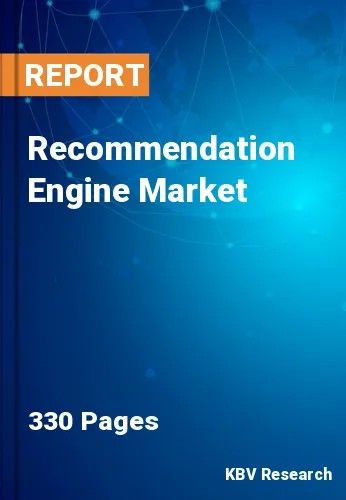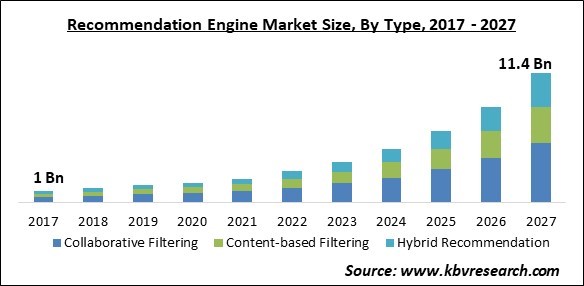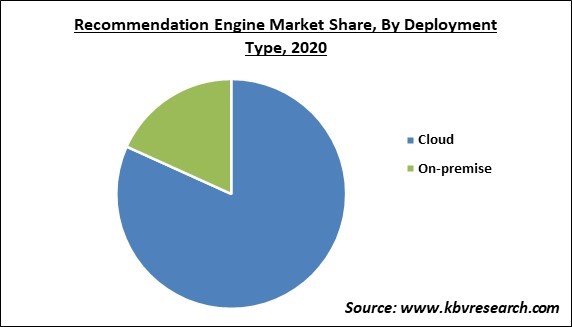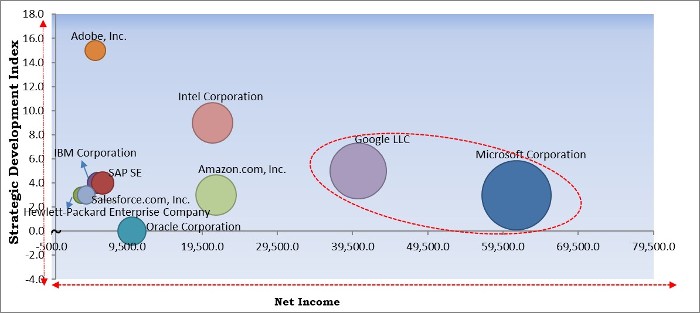
The Global Recommendation Engine Market size is expected to reach $11.4 billion by 2027, rising at a market growth of 32.5% CAGR during the forecast period.
Recommendation engines are data filtering technologies that use a variety of algorithms and data to suggest the most relevant results to a certain client. It begins by capturing a customer's prior behavior and then offers products that the customers are likely to purchase based on that information. The integrated software system evaluates the available data to provide recommendations for things (products/services) that a website user might be interested in, among other things. E-commerce, social media, and content-based websites all use recommendation engines systems.
Many firms are attempting to integrate technology such as artificial intelligence (AI) with their apps, businesses, analytics, and services due to the growing competition in their respective markets. The majority of companies across the world are pursuing digital transformation, concentrating on improving customer and employee experiences through automation technologies.
Retailers may use digital transformation to connect with new customers, better engage with existing customers, save operating costs, and increase employee motivation. Along with that, the rising digitalization and high adoption of smart devices by the consumers would fuel the demand and growth of the recommendation engine market over the forecast period.

The outbreak of the COVID-19 pandemic has significantly impacted various companies across the business domain. Several businesses have taken precautionary in response to the COVID-19 pandemic, which has resulted in the closure of some establishments. As a result, businesses all over the world are experiencing short-term difficulties in areas such as sustained revenues, health and safety, supply chain management, labour shortages, and pricing, to mention a few.
Additionally, suppliers can use digital transformation to gain new consumers, communicate with existing customers, lower the cost of corporate operations, and boost employee enthusiasm. These benefits have a favourable effect on earnings and surpluses. This would positively impact the demand for recommendation engines among the enterprises in the coming years.
The increased focus on improving customer experience in the digital space is a primary factor driving the demand for recommendation engines by the companies. Furthermore, it is critical to improve customer experience in order to increase customer engagement and retention, as well as to boost revenue and return on investment (RoI). Upselling and cross-selling opportunities arise naturally as a result of smart product suggestions made by using recommendation engine.
Online buying has increased as a result of the rise in digitization across the world and the emergence of new e-commerce platforms. These recommendation engines enable easy browsing and display products or information based on the customer's past search. Furthermore, mobile phone ownership is highly contributing to e-commerce growth and encouraging e-commerce companies to use recommendation engines.
Consumers can obtain more credible feedback if a recommendation engine generates more personal data. The recommender may acquire information such as the user's identification, demographic profile, behavioural data and purchase history, ranking history, and more. These details could be particularly sensitive in terms of privacy. Providing this information to the companies can increase the risks of privacy and security breaches. The data could be sold to a third party without the client's authorization, or it could be hacked by the attackers.

Based on type, the recommendation engine market is classified into Collaborative Filtering, Content-based Filtering and Hybrid Recommendation. The collaborative filtering segment dominated the recommendation engine market with the maximum revenue share in 2020 and is estimated to maintain its dominance over the forecast period. This is due to increasing demand for dependable recommendation engines by the e-commerce companies to improve their consumers' shopping experiences by proposing products based on their tastes and preferences. For example, Spotify employs collaborative filtering to suggest “Discover Weekly” and other playlists to listeners based on their previous listening habits.
By application, the recommendation engine market is classified into Personalized Campaigns and Customer Delivery, Strategy Operations & Planning and Product Planning and Proactive Asset Management. The personalized campaigns and customer delivery segment acquired the largest revenue share in the recommendation engine market and is estimated to maintain its dominance during the forecast period. It is owing to the increase in the requirement to provide better customer experience and services by various companies across different industrial verticals.
On the basis of deployment type, the recommendation engine market is bifurcated into cloud and on-premise. The cloud segment procured the highest revenue share in the recommendation engine market in 2020 and is anticipated to continue this trend over the forecast period. This is due to an increase in demand for such solutions by companies that are using cloud technologies to integrate recommendation engines into their web-based services. Several companies in the media and entertainment and retail industries are highly using Cloud since most of their data is stored on cloud storage.
Based on organization size, the recommendation engine market is segmented into large enterprises and small & medium enterprises. The large enterprise segment garnered the highest revenue share in the recommendation engine market in 2020 and is projected to maintain this trend during the forecast period. It is owing to the high adoption of recommendation engines by the large enterprises to make better business decisions, manage their company portfolio more efficiently, and gain a competitive advantage in the market.
Depending on the end-use, the recommendation engine market is divided into Information Technology, Healthcare, Retail, BFSI, Media & Entertainment and Others. The retail segment procured the maximum revenue share in the recommendation engine market in 2020 and is anticipated to continue this trend during the forecast period. It is due to increased competition in the market, along with that, e-commerce and retail firms are increasingly adopting recommendation systems to give better and faster services to their customers.
| Report Attribute | Details |
|---|---|
| Market size value in 2020 | USD 1.8 Billion |
| Market size forecast in 2027 | USD 11.4 Billion |
| Base Year | 2020 |
| Historical Period | 2017 to 2019 |
| Forecast Period | 2021 to 2027 |
| Revenue Growth Rate | CAGR of 32.5% from 2021 to 2027 |
| Number of Pages | 330 |
| Number of Tables | 543 |
| Report coverage | Market Trends, Revenue Estimation and Forecast, Segmentation Analysis, Regional and Country Breakdown, Competitive Landscape, Companies Strategic Developments, Company Profiling |
| Segments covered | Type, Application, Deployment Type, Organization Size, End Use, Region |
| Country scope | US, Canada, Mexico, Germany, UK, France, Russia, Spain, Italy, China, Japan, India, South Korea, Singapore, Malaysia, Brazil, Argentina, UAE, Saudi Arabia, South Africa, Nigeria |
| Growth Drivers |
|
| Restraints |
|
Region-wise, the recommendation engine market is analyzed across North America, Europe, Asia Pacific and LAMEA. North America emerged as the leading region in the recommendation engine market with the largest revenue share in 2020 and is projected to continue this trend over the forecast period. This is due to the growing acceptance of modern technology as well as increased government support for developing technologies in this region.

Free Valuable Insights: Global Recommendation Engine Market size to reach USD 11.4 Billion by 2027
The major strategies followed by the market participants are Product Launches. Based on the Analysis presented in the Cardinal matrix; Microsoft Corporation and Google LLC are the forerunners in the Recommendation Engine Market. Companies such as Amazon.com, Inc., SAP SE and Intel Corporation are some of the key innovators in the Market.
The market research report covers the analysis of key stake holders of the market. Key companies profiled in the report include IBM Corporation, Oracle Corporation, Microsoft Corporation, SAP SE, Salesforce.com, Inc., Adobe, Inc., Google LLC, Intel Corporation, Hewlett-Packard Enterprise Company, and Amazon.com, Inc.
By Type
By Application
By Deployment Type
By Organization Size
By End Use
By Geography
The recommendation engine market size is projected to reach USD 11.4 billion by 2027.
Rising focus on enhancing customer satisfaction are driving the market in coming years, however, security and Privacy Concerns limited the growth of the market.
IBM Corporation, Oracle Corporation, Microsoft Corporation, SAP SE, Salesforce.com, Inc., Adobe, Inc., Google LLC, Intel Corporation, Hewlett-Packard Enterprise Company, and Amazon.com, Inc.
The expected CAGR of the recommendation engine market is 32.5% from 2021 to 2027.
The North America market dominated the Global Recommendation Engine Market by Region 2020, and would continue to be a dominant market till 2027.
Our team of dedicated experts can provide you with attractive expansion opportunities for your business.
